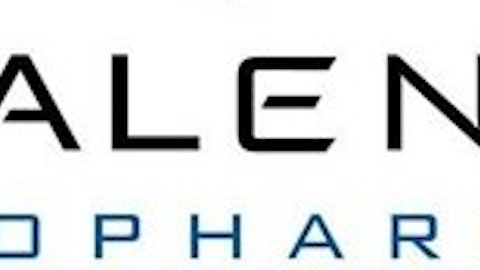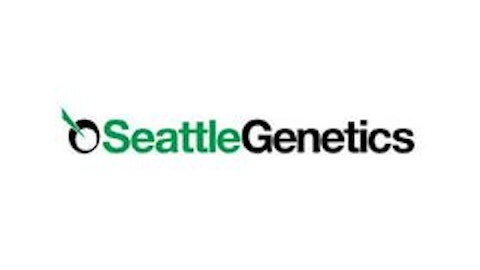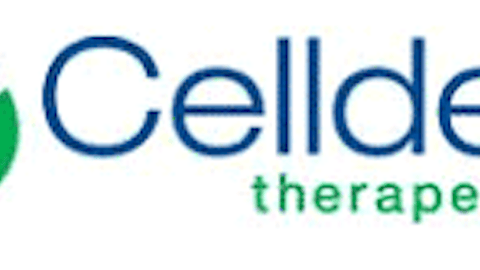With more than 230,000 women diagnosed with breast cancer in the U.S. annually – and Roche’s Herceptin producing annual sales of more than $5 billion – the potential for breast cancer drugs is enormous. While there are many companies developing drugs to treat the disease, there are two specifically with late-phase drugs that have been favorites in the market.
A breakthrough drug
Since the start of 2012, Celldex Therapeutics, Inc. (NASDAQ:CLDX) has seen its market capitalization increase from under $200 million to $1.15 billion. While the company does have a product in clinical development for brain cancer (rindopepimut), almost all of its upside has been tied to the Phase II trials (and results) from CDX-011.
CDX-011 is a vaccine used to treat patients with advanced/metastatic breast cancer who express the protein GPNMB. The FDA has granted Fast Track designation to CDX-011 for the treatment of advanced, refractory/resistant GPNMB-expressing breast cancer.
What’s impressive about CDX-011 is that it was proven effective on patients who had no longer responded to a median of five-six prior therapies; meaning most difficult to treat. Yet, of the 120 patients treated with CDX-011, 33% had a response rate compared to no response in patients using chemotherapy. Moreover, CDX-011 slowed the growth of tumors by 100% compared to its control arm.
Due to the stage of the disease, such progress is considered incredible. The technology used is equally impressive, as the success from the trial proves that targeting GPNMB is highly effective in treating such violent diseases. Thus, investors are excited that this protein is also expressed in multiple tumors such as melanoma and glioma.
Moving forward, the question is not whether the drug will be approved, but rather when it will be approved. The FDA is already showing favoritism towards the drug, and has a history of rapidly approving drugs for life-threatening cancers. As a result, there’s a lot to like when it comes to Celldex Therapeutics, Inc. (NASDAQ:CLDX).
Excitement without a clinical benefit
While Celldex Therapeutics, Inc. (NASDAQ:CLDX) has seen its valuation increase with data, Galena Biopharma Inc (NASDAQ:GALE) has seen its value increase with the idea of a successful study and the “upside” of its breast cancer drug. Galena’s drug NeuVax activates specific cytotoxic T lymphocytes (CTLs) to recognize and destroy HER-2 expressing cancer cells.
Celldex Therapeutics, Inc. (NASDAQ:CLDX)’s drug fights cancer at its most advanced stages, while Galena Biopharma Inc (NASDAQ:GALE) is using its vaccine to prevent breast cancer recurrence for those who express this “HER-2” antigen. Much like CDX-011’s GPNMB, HER-2 is expressed in a number of other cancers. However, the upside for NeuVax is nowhere near as clear as with CDX-011.
NeuVax was tested in a previous Phase I/II study before beginning its current Phase III 700 patient trial. The study itself was a disaster as patients were not dosed correctly and the balance of those who were “healthier” was clearly one-sided in the favor of NeuVax. Regardless, the Phase 2 trial was not statistically significant – but Galena Biopharma Inc (NASDAQ:GALE) did find a select group of patients who did not redevelop breast cancer as quickly – those who are node-positive and express HER-2 +1/+2.
Galena Biopharma Inc (NASDAQ:GALE) seems to have built this study by twisting and bending all of the results associated with the original study. With NeuVax being tested on node-positive HER-2 +1/+2 patients from a small 50 patient subgroup, I am not sure how investors could be encouraged heading into a large Phase III trial.
The big picture
The company (and investors) have chosen to ignore the big picture. NeuVax is a product that was purchased for about $7 million from a near bankrupt private company Apthera. Galena Biopharma Inc (NASDAQ:GALE) purchased this product when its clinical products as RXi Pharmaceuticals all failed; and no more money could be squeezed from investors.
Right now, with what we know, you should wonder how investors could be happy with what they see from Galena. The company has seen its valuation increase from $40 million to $200 million since January 2012 and has given no reason to believe that NeuVax will be successful in a Phase 3 trial – but rather, management touts the drug’s “potential”.
For the sake of argument, if NeuVax was successful, it would be entering a large market treating an unmet medical need. Galena Biopharma Inc (NASDAQ:GALE) consistently touts Roche’s Herceptin by ensuring to disclose the $5 billion per year that it returns annually in several press releases.
Herceptin is approved to prevent breast cancer recurrence in those who are HER2 +3, or those expressing the highest of HER2 levels. According to Galena, less than 30% of breast cancer patients are eligible for Herceptin, insinuating that the remaining 50-75% would be eligible for NeuVax. The problem is that Galena Biopharma Inc (NASDAQ:GALE) is yet to prove that NeuVax works on any patient population. My theory is that if NeuVax were good, Roche would’ve acquired it, and the vaccine wouldn’t have been acquired for $7 million by RXi Pharmaceuticals — I mean Galena Biopharma.
Conclusion
Wouldn’t it be great if every biotechnology company that failed a clinical trial could remove the patients who caused the study to fail and only focus on the select few that showed some level of improvement? That’s exactly what Galena Biopharma Inc (NASDAQ:GALE) has done!NeuVax was tested on 187 patients – but 137 patients are being removed from the failed study so Galena can focus on 50 who did not redevelop breast cancer. Naturally, if breast cancer’s recurrence rate is only 20% then surely Galena could find 50 from 187 who didn’t redevelop the disease – but it doesn’t mean that NeuVax was the cause.
Celldex Therapeutics, Inc. (NASDAQ:CLDX) has already proven that its drug works. CDX-011 has already extended life, slowed progression, and had a high response rate in 120 patients. To me, it is clear which product has the highest upside in the breast cancer market. When you consider CDX-011’s sales potential of $700 million and the fact that Celldex has a large pipeline with one other late-stage brain cancer drug, I think it’s clear that Celldex makes a great investment.
Sherrie Stone has no position in any stocks mentioned. The Motley Fool has no position in any of the stocks mentioned.
The article Good And Bad Breast Cancer Drugs originally appeared on Fool.com.
Copyright © 1995 – 2013 The Motley Fool, LLC. All rights reserved. The Motley Fool has a disclosure policy.



